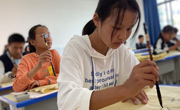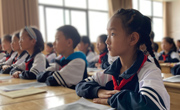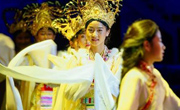Friendship that travels far and wide
There is a mysterious and ancient continent named Africa, and on this continent where the waves of the Atlantic Ocean slap the eastern shores, stands one of the youngest countries, Namibia. “The Land of the Brave”, though tens of thousands of miles away from China, keeps the long-standing friendship between the two peoples running vibrantly. During the over-30-year national liberation movement in Namibia, the Chinese people always unswervingly gave their political, material and moral support. Diplomatic relations were established immediately following Namibia’s independence on March 22, 1990, and a comprehensive strategic partnership was declared in 2018.
This year marks the 30th anniversary of the establishment of diplomatic relations of China and Namibia. When the coronavirus (COVID-19) pandemic broke out in China, Namibian President Geingob, the ruling Party of South West African People’s Organization (SWAPO Party) and Friendship City immediately expressed their support and condolences to China with President Geingob being the first head of State in southern Africa to speak to President Xi Jinping on telephone. Meanwhile, China repaid with assistance to Namibia to combat the pandemic in various forms organized by both government officials and ordinary citizens, receiving praise from the local public as the earliest, largest, fastest and most practical assistance, and “fully demonstrating the bilateral all-weather friendship and brotherly generosity”. Although scheduled celebrations for the 30th anniversary of the establishment of diplomatic relations between China and Namibia were interrupted by the pandemic, a spectacular celebratory event was still held in the Chinese Embassy in Namibia.
In July, Ambassador Zhang Yiming welcomed a group of special guests at the residence of the Chinese Ambassador, where three presidents of Namibia and celebrities from all walks of life had visited. The presence of the first guest was a hale and hearty old lady on crutches wearing a cheongsam, Ms. Angeli, the pioneer of Namibia’s independence struggle and one of the founders of the South West Africa (former name of Namibia) National Union (SWANU). The other two guests were Namibia’s Speaker of Parliament, Professor Katjavivi, and Ms. Pakaraj, a senior member of the SWAPO Party.
The three guests, all in their eighties, have deep affection for China. Ms. Pakaraj was the head of Southwest African Women’s delegation, the earliest visitor to China, and Ms. Angeli was one of the four members of the delegation. They carefully took out from the package some historical materials, including precious black-and-white photos of China, invitations to the first National Day reception at the Chinese Embassy after the establishment of diplomatic ties between China and Namibia, and written documents of the friendship with their Chinese friends. Time has worn these materials out, but time has also coated them with simple, modest, and heart-touching qualities. They are the memory of China-Namibia friendship over the past six decades, and these beautiful stories were brought back to life as exciting as they were in the ladies’ narrative.
The Unforgettable Journey of “Learning” to the East
In the 1960s, the national liberation movement in Africa was in full swing and many African countries had gained independence, Namibia, however, was still under colonial rule. Namibian revolutionaries, represented by the founding father, Nujoma, rose up and embarked on a difficult struggle for national independence with the support of the people of China and other friendly countries. In February 1964, encouraged by their revolutionary predecessors, four women in their early twenties, including Pakaraj and Angeli, set out on the “Long March” to the mysterious East with a firm belief in reaching China, becoming the first Southwest Africans to set foot on Chinese soil. They crossed the border from Namibia on foot, dodging police chase during the day and guarding against lions, leopards and other wild animals at night. They passed through forests, rivers, wilderness and hills in Botswana and Zambia and they even climbed old-fashioned trains. After months of twists and turns and the hardships of lack of travel documents and hunger, they finally received the necessary travel documents with the help of the Chinese side and boarded the aircraft from Zambia to Beijing via Tanzania, Pakistan, Cambodia and other countries.
Angeli said she had visited more than 20 countries, but her visit to China was unique. The visit to China was a mission of “learning from China” assigned by the delegation, and the six-month learning in China was not only knowledge-expanding but also spirit-enlightening because of the family-like treatment they received. At that time, being able to speak a few sentences of Chinese and to quote Chairman Mao’s classical sayings was the top fashion for young African revolutionaries, and their cordial reception by Mao Zedong, Liu Shaoqi, Zhou Enlai, Chen Yi and other senior Chinese leaders was an even greater honor. The stay in China was rich and informative: participating in All-China Women’s Federation Congress and visiting different provinces and cities left them with indelible memories, deepened their understanding of Chinese culture and revealed the real Chinese society in depth. They were also impressed by the unique Chinese cuisine and the interesting dining etiquette. The dynamism, orderliness, equality and progress in all aspects of society under the leadership of the Communist Party of China were hard to forget, and the patriotic, kind, friendly, hardworking and polite Chinese people were heart-warming.
Fifty-six years have passed, but the memory of the Chinese Communist Party carrying out rural poverty alleviation never faded. The vivid image of young Chinese working on agricultural and energy infrastructure projects in well-organized rural communities never grows old, especially those energetic working women. They raised the sails of hope and ignited the fires of revolution and construction in their hearts for Namibia. Ms. Angeli praised China for its remarkable achievements, which had been made possible by decades of strong leadership of the Communist Party of China and the unity and determination of its people to work towards innovative and challenging goals. Namibia should learn more from China.
Speaker Katjavivi also fondly recalled his many visits to China since 1960s, and said that the old generation of Namibian politicians hold a special affection for China, and that many revolutionaries had spent the most difficult days with the “Selected Works of Mao Zedong”, which many old revolutionaries still read and gain new knowledge of today. He expressed his heartfelt appreciation of the successful and invaluable experience of the Chinese Communist Party in leading the Chinese people to build a poor and weak country into the world’s second largest economy and a major power. Over the decades, Namibians had drawn their wisdom and strength from the brotherly Communist Party of China for all the reforms they had undertaken. Although SWAPO Party has encountered some difficulties in recent years, lessons have now been learned to innovate and remove weakness, and the pace of learning from the Communist Party of China has been significantly accelerated. In 2018, SWAPO Party included the goal of building socialism with Namibian characteristics in its constitution; after the 2019 general election, SWAPO Party Central Committee advocated criticism and self-criticism within the Party, and asked all Party members to “remain true to our original aspiration”, “put the people at the center” and reinforce the party’s mass base; President Geingob, in particular, is pursuing a vigorous campaign against corruption and privilege and has made the eradication of poverty his government’s top priority.
“I love China”
“I love China” was always the involuntary exclamation of the guests at the celebratory luncheon, who, though belonging to different parties, share a strong attachment to China, and whose lives have been tied to China since their first visit, as it is embedded in their youth and closely tied to the future of Namibia. The guests recalled gratefully the eventful years of resistance against colonial rule in Namibia, when, despite their own modest means, the Chinese people had provided selfless material assistance and all-round moral support to Namibia. Although they had not been able to return to China over the decades, both ladies had been following China’s development, rejoiced at the great news from China and concerned by the difficulties and setbacks that China had encountered. They said heartily that the first moment they heard about COVID-19 outbreak in China, they thought of going to the Chinese Embassy to tell their Chinese brothers that we will always stand by your side.
Ambassador Zhang Yiming said in his speech that this year marks the 30th anniversary of the diplomatic relations between China and Namibia, and next year will mark the 100th anniversary of the founding of the Chinese Communist Party. The Chinese people cherish love and loyalty and have always valued the deep friendship with old friends. The Chinese Embassy will never fail to open its doors to friends and is always willing to share with them the history of China’s development and the useful experience of the Communist Party in governing the country. The most fundamental reason for China’s achievements today is its adherence to the leadership of the CPC and to the path of socialism with Chinese characteristics. Ambassador Zhang said that China has achieved significant results in fighting COVID-19 and will overcome difficulties this year to achieve the goal of eliminating extreme poverty and building a moderately prosperous society in all respects. At that moment, despite their old age, several guests stood up to celebrate in excitement. Angeli, who was unable to stand up, raised her fist and shouted “I love you, China”.
China has gone through that turbulent era and shines in the East today. In the new era, the ever-growing and strengthening Sino-African relations have witnessed many touching stories of love and care for one another, and more magnificent and touching songs of solidarity in the face of the pandemic have been written by both sides with the Community of Shared Future for China and Africa.
When we set foot on African soil for the first time, our predecessors told us that Chinese diplomats should be ambassadors of China-Africa friendship, and that this friendship between countries should be nurtured and inherited in the people-to-people friendship, said Zhang The stories of the three elders explicitly illustrate the true meaning of China-Africa friendship, which is not just an empty saying or slogan, but the history of struggle of the Chinese and African peoples, the national memory of mutual sympathy, the grand cause of building a Community of Shared Future for China and Africa, and the shared aspiration of helping each other.
[ Editor: LJM ]










More From Guangming Online
Medics from Fujian leave for Shanghai to aid in battle against COVID-19 resurgence
New int'l land-sea transport service to Indo-China Peninsula launched
Another makeshift hospital under construction in Shanghai
Tourists view tulips in Suiping County, Henan
In pics: blooming gagea flowers on grassland in Zhaosu, Xinjiang
Greek workers stage 24-hour general strike over high prices